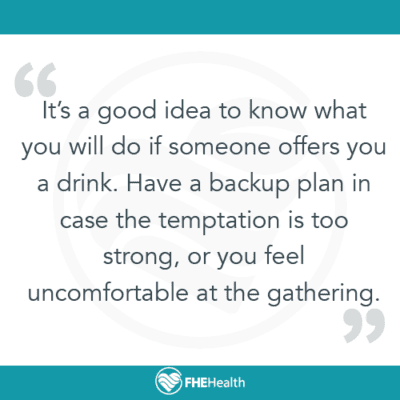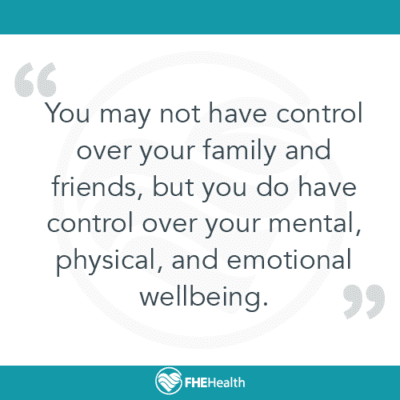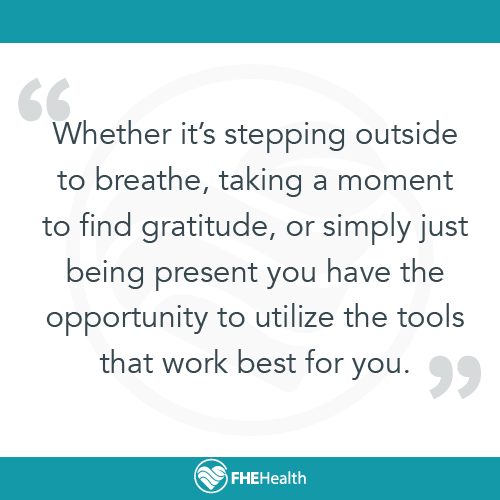
“It’s the most wonderful time of the year.” The holidays are supposed to be filled with lots of family, tidings, and good cheer. However, the holiday season can be a difficult time for anyone, especially for someone in recovery. Holiday schedules are often riddled with trigger-filled parties, over-commitment, painful memories, uncomfortable gatherings, and unrealistic expectations. This time of year is generally accompanied by the added stress of money, work, and family dysfunction. Away from a recovery safe haven, many addicts and alcoholics are left vulnerable and unequipped to face the hustle and bustle of the holidays. Here are some tips on embracing this holiday season without sacrificing your sobriety.
 Have a plan.
Have a plan.
First and foremost, we learn that it’s always best to be prepared before we go into any situation. Preparation can be the make or break for alcoholics – especially during the holidays. For example, when you are getting ready to celebrate the holidays at a family member’s house be sure to know when the party begins and when it ends, who will be there, and possible scenarios you can expect.
Even if you think you know exactly how a situation will play out, it’s always best to be prepared for the unexpected. It’s a good idea to know what you will do if someone offers you a drink. Have a backup plan in case the temptation is too strong, or you feel uncomfortable at the gathering. Bring a sober friend along for support and is willing to leave with you if you feel uncomfortable. It’s never a bad idea to let the hosts or other family members about your situation and potential triggers, so no one will be offended if you have to leave early.
Be selfish and practice self-care.
Addiction and recovery are both selfish. Many selfless actions come out of recovery, but the foundation of your recovery must be about making the decisions that are best for you and your life. Self-care is one of the most important practices to implement during the holiday season. In early recovery, we learn that we are powerless over mood/mind-altering substances, people, places, and things. You may not have control over your family and friends, but you do have control over your mental, physical, and emotional wellbeing.
- Mental – Practice self-care by indulging in meditation, reading a book, and talking with your sober support. “There’s no better time than the present.” It’s so easy to get caught up in the holiday festivities. We often forget to be still and enjoy the moment.
- Physical – “An idle mind is the devil’s playground.” If you find yourself with too much idle time, you should try taking a yoga class, going for a walk, or exercising to keep yourself active and away from obsessing.
- Emotional – It is vital that you take the time to honestly assess how you’re feeling and understand why you may be feeling stressed, angry, or triggered. Call your sponsor and inventory the uncomfortable feelings you may be experiencing.
 Maintain your regular schedule.
Maintain your regular schedule.
When anxieties rush in like a tidal wave, we can stick to the structured methods we’ve created and calm the raging seas in our minds. For example, if you attend meetings regularly – now is not the time to stop attending. Look up local meetings in the area you will be staying. Commit to attending meetings during this busy season. If you wake up and meditate, call your sponsor daily, and write your inventory before bed – maintain your regular schedule.
The holidays can be extremely stressful and busy, but you should do your best to remain consistent with the activities and tools that have kept you sober. Implementing discipline to your regular schedule can protect you from reminiscing about the old places you used to hang out and avoid former acquaintances who may not be the best influence. “Out of sight, out of mind.” Whether it’s stepping outside to breathe, taking a moment to find gratitude, or simply just being present you have the opportunity to utilize the tools that work best for you.
 Stay true to yourself and remember it’s okay to say no.
Stay true to yourself and remember it’s okay to say no.
Before you begin committing to a holiday engagement, it is important that you take an honest look within yourself and consider whether you can handle being in an environment where alcohol is present. Honesty is a critical component of maintaining long-term sobriety. Before you head to a holiday party, you should meet with your sponsor and discuss fears, triggers, and any emotions you may be feeling about the holidays.
The pressure to attend every holiday party and stay in a situation you may be uncomfortable in can be extremely stressful. Therefore, it is important that you remain true to yourself. Taking an honest inventory of how you’re feeling and understanding it’s okay to say no, is the best way to ensure your sobriety. Your recovery is most important. If you need to avoid parties, bars, or people that may be triggering, it is absolutely acceptable and the best idea to make other plans.
Remove expectations and practice acceptance.
The holidays often bring a variety of expectations – whether they are on you or someone else. “Expectations are premeditated resentments.” You should not allow these presumptions to deter you in any way. You cannot pretend to know anyone’s intentions or circumstances, and you cannot expect them to understand yours. It is best to keep it simple, be present, find gratitude, and enjoy the holiday season.
The hustle and bustle of spending time with family, rushing to get gifts, and unrealistic expectations are all perfect triggers for anxiety. When you refuse to accept things as they are, chaos ensues. From the loud, obnoxious family members to the disgruntled holiday shoppers/drivers, there’s an overwhelming weight and stress lifted when you accept the outcome of any and all circumstances looming over your holiday season.






